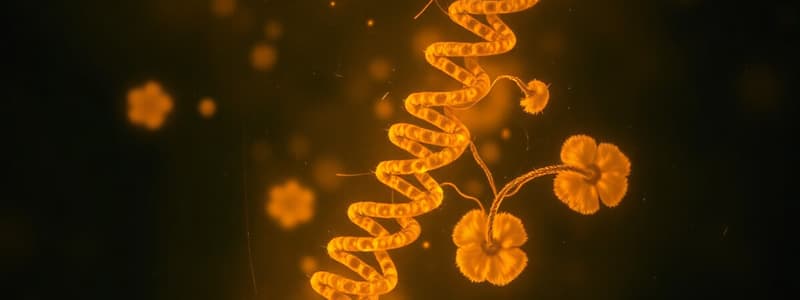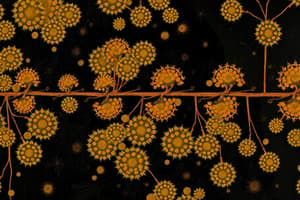Podcast
Questions and Answers
What contributes to the increased complexity of gene regulation in eukaryotes?
What contributes to the increased complexity of gene regulation in eukaryotes?
Which level of regulation involves modifying the structure of chromatin to influence gene accessibility?
Which level of regulation involves modifying the structure of chromatin to influence gene accessibility?
What are transcription factors primarily responsible for in eukaryotic gene regulation?
What are transcription factors primarily responsible for in eukaryotic gene regulation?
What is one effect of post-transcriptional regulation involving microRNAs?
What is one effect of post-transcriptional regulation involving microRNAs?
Signup and view all the answers
Which process is involved in the maturation of mRNA before translation occurs?
Which process is involved in the maturation of mRNA before translation occurs?
Signup and view all the answers
Phosphorylation of proteins affects which of the following?
Phosphorylation of proteins affects which of the following?
Signup and view all the answers
What is a function of ubiquitination in post-translational regulation?
What is a function of ubiquitination in post-translational regulation?
Signup and view all the answers
What is the primary function of repressors in prokaryotic gene regulation?
What is the primary function of repressors in prokaryotic gene regulation?
Signup and view all the answers
Which molecule acts as an inducer in the lac operon when lactose is present?
Which molecule acts as an inducer in the lac operon when lactose is present?
Signup and view all the answers
What role does cAMP play in the regulation of the lac operon?
What role does cAMP play in the regulation of the lac operon?
Signup and view all the answers
What process does the trp operon primarily regulate?
What process does the trp operon primarily regulate?
Signup and view all the answers
Under what condition does the trp repressor bind to the operator in the trp operon?
Under what condition does the trp repressor bind to the operator in the trp operon?
Signup and view all the answers
What role do inducers play in prokaryotic gene regulation?
What role do inducers play in prokaryotic gene regulation?
Signup and view all the answers
Which component is NOT part of the lac operon structure?
Which component is NOT part of the lac operon structure?
Signup and view all the answers
What happens to RNA polymerase in the presence of lactose at the lac operon?
What happens to RNA polymerase in the presence of lactose at the lac operon?
Signup and view all the answers
Study Notes
Prokaryotic Gene Regulation
- Genes involved in a specific function are often clustered in operons in prokaryotes, enabling coordinated regulation.
- Gene expression in prokaryotes is primarily controlled transcriptionally, using repressors, activators, and inducers.
- Repressors bind to operator regions to block transcription.
- Activators bind to promoter regions to enhance transcription.
- Inducers are small molecules that can either activate or repress transcription based on cellular conditions.
The Lac Operon
- The lac operon in E. coli is a key example of prokaryotic gene regulation.
- It contains genes for lactose metabolism, regulated by glucose and lactose levels.
- The lac operon has the lacI gene (repressor), CAP binding site, promoter, operator, and structural genes (lacZ, lacY, lacA).
- In the presence of lactose, allolactose (converted from lactose) acts as an inducer, preventing repressor binding, allowing RNA polymerase to transcribe.
- Low glucose levels increase cAMP, which activates CAP, enhancing RNA polymerase binding to the promoter and boosting transcription.
The Trp Operon
- The trp operon, regulating tryptophan biosynthesis, uses repressible control.
- When tryptophan levels are high, it acts as a corepressor, binding to the trp repressor and allowing it to block transcription.
Eukaryotic Gene Regulation
- Eukaryotic gene regulation is more complex due to larger genomes, separation of transcription (nucleus) and translation (cytoplasm), and multiple regulatory levels.
- Regulation occurs at various stages: chromatin accessibility, transcription, RNA processing, RNA stability, translation, and protein activity.
Chromatin Accessibility
- Chromatin structure (DNA + histone proteins) modification affects gene accessibility for transcription.
Transcriptional Regulation
- Cis-acting sequences (promoters, enhancers, silencers) on DNA influence nearby gene transcription.
- Transcription factors bind to DNA regulatory sequences and regulate transcription as activators or repressors.
Post-Transcriptional Regulation
- Alternative splicing produces diverse mRNA isoforms from a single pre-mRNA by selectively including or excluding exons.
- Small regulatory RNAs, like microRNAs (miRNAs), target mRNAs for degradation or translational inhibition.
- mRNA editing alters mRNA nucleotide sequences, impacting protein sequences.
Post-Translational Regulation
- Post-translational modifications (phosphorylation, ubiquitination) alter protein activity, localization, and interactions.
- Phosphorylation adds phosphate groups.
- Ubiquitination targets proteins for degradation by the proteasome.
Studying That Suits You
Use AI to generate personalized quizzes and flashcards to suit your learning preferences.
Description
Explore the essential mechanisms of gene regulation in prokaryotes, focusing on the lac operon in E. coli. Learn how operons enable coordinated gene expression and the roles of repressors, activators, and inducers in transcription control. This quiz will test your understanding of these regulatory systems and their biological significance.




